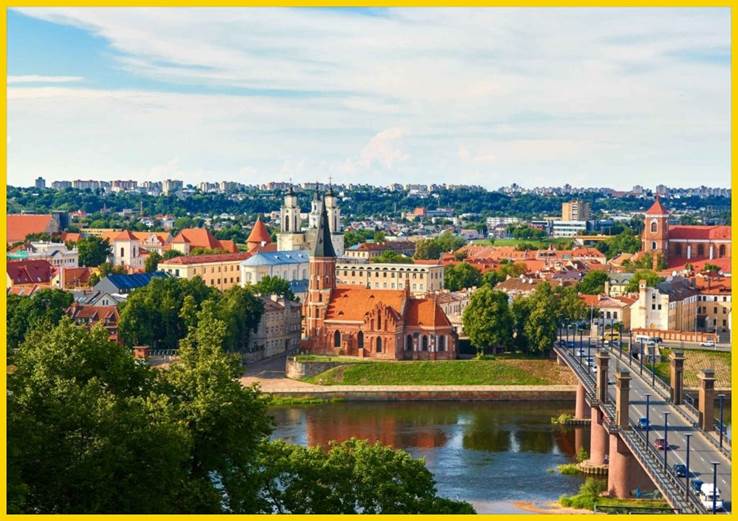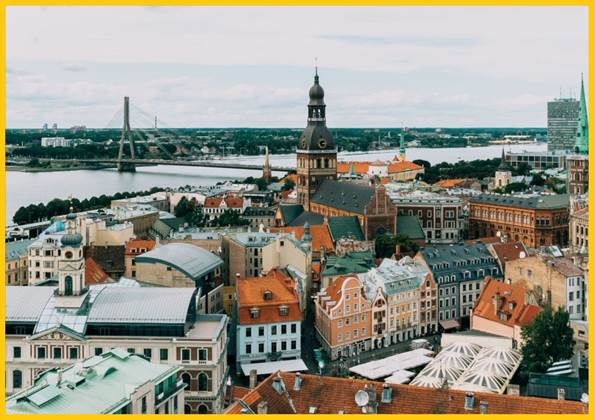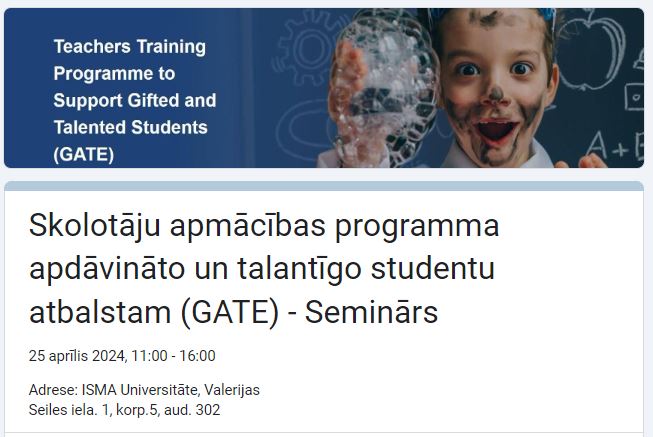
GATE is an international project financed under the Erasmus+ programme. GATE aims to enhance the competencies and skills of primary education teachers and mentors to help gifted and talented pupils (age 8-11 y.o) develop their full potential.
About Project
GATE (“Teachers Training Programme to Support Gifted and Talented Students”) project aims to enhance the competencies and skills of primary education teachers and mentors to help gifted and talented pupils (age 8-11 y.o) develop their full potential. To fulfill this wide goal, the project also foresees the attainment of the following 4 specific objectives:
- To design an innovative teaching methodology for GATE pupils;
- To provide a training programme for primary education teachers;
- To increase the academic performance of “gate underachievers” in STEM subjects;
- To increase awareness among teachers, educators, school staff, public authorities, and education experts about GATE students.
The Project
In the last decades, there has been a consistent increase in the interest towards the issue of gifted and talented underachievers. The current shifts in the nature of the global economy and the rapid technological advancements have led to major transformations in the type and availability of jobs in advanced countries.
With 75% of the fastest growing occupations requiring skills and knowledge in science, technology, engineering and mathematics (STEM), forecasts claiming that 40% of current occupations will be lost to automation in the next 20 years and the realization that Western countries are lagging behind their Asian peers in subjects critical to innovation (White, 2018), many European countries have been invested by a competitive anxiety.
The increasing pressure of globalization, economic competitiveness and the unsatisfactory results of pupils’ performance have led to increased focus on the academic achievement of gifted and talented students, who have the potential to become the innovators and leaders of the future.
Giftedness and talent are defined as “performance that is clearly at the upper end of the distribution in a specific talent domain even relative to other high-functioning individuals in that domain” (Subotnik et al., 2012). However, even when pupils are recognized to be capable of providing similar performances, they often fall short and fail to express their full potential. These cases are referred to as “gifted underachievement”.
Several researchers have been investigating the causes of this phenomenon, with most of them identifying such causes in the following 3 domains:
(i) motivation,
(ii) emotion,
(iii) school perception.
To help these pupils achieve their full potential, new teaching strategies are required.
Gifted pupils in the "GATE" project are:
1) "Pupils with an IQ of at least two standard deviations above the mean (at least 130 IQ)."
2) “Pupils who perform or have the ability to perform tasks and activities at a higher level than their peers” (Subotnik et al., 2012). 3) "Pupils who can effectively acquire knowledge and skills, apply them to solve new problems, learn quickly from experience and have a high level of creativity".
Project period: 01.01.2022 – 30.04.2024
Erasmus+ program: KA220 – Cooperation partnerships in school education
Target groups: Primary education teachers, mentors, gifted and talented pupils
Stakeholders: Public authorities, education experts, researchers, school staff.
Aim and objectives: GATE project aims to enhance the competencies and skills of primary education teachers and mentors to help gifted and talented pupils (age 8-11 y.o) develop their full potential. To fulfil this wide goal, the project foresees also the attainment of the following 4 specific objectives:
To design an innovative teaching methodology for GATE pupils;
To provide a training programme for primary education teachers;
To increase the academic performance of “gate underachieveres” in STEM subjects;
To increase awareness among teachers, educators, school staff, public authorities and education experts about GATE students.
Results: GATE foresees the realization of two main Results (R):
- R1: GATE Methodological Material. A new teaching methodology for GATE students that will merge Socio-emotional learing and the STEAM approach.
- R2: GATE Training Programme. A training programme for primary education teachers on the methodology devised. It will consist of at least 4 modules:
Theoretical basis and review of teaching practices for GATE pupils;
Teaching to GATE pupils in primary school;
Teaching in GATE pupils only classes;
Evaluation and assessment tools for teachers.
Partners
- VsI "eMundus" (Lithuania)
- Vytautas Magnus University(Lithuania)
- ISMA University(Lativa)
- Zinev Art Technologies(Bulgaria)
- Ron Vardi Center(Israel)
Results
R1: GATE Methodological Material

The objective of this result (R1) is to establish new knowledge (Methodological Material) of innovative teaching methods and aspects to consider for teachers when they are dealing with gifted and talented pupils. It concentrates both on the cognitive and psychological needs of gifted and talented pupils, integrating the STEAM approach with elements of Socio- Emotional Learning (SEL). The results are included in an e-book.
The goals of this output are:
- To provide and disseminate innovative methodologies, resources, instructions and materials for teachers capable of promoting students’ critical thinking skills and independent learning.
- Promote further research on effective and efficient practices when dealing with gifted and talented pupils.
Content

All the content developed is included in an e-book comprising a vast literature review from different sources (e.g. peer-reviewed articles, books, web sources, etc.) with a general aim to establish effective ways of maximizing the potential of gifted and talented pupils. A wide set of approaches was analyzed in terms of their most recent practices and theory, effectiveness and results on children as well as how they can be better adopted in schools and education centers for gifted and talented pupils. Schools’ and centers’ opinions were collected in order to better understand and incorporate their needs in the design of our methodology.
The methodological material impact school staff, teachers and education experts by enhancing their awareness on good practices when dealing with gifted and talented pupils. It also impact researchers as it lay the foundation for further research and improvements.
R2: GATE Training Programme

This Result (R2) aims to develop a training program for primary education teachers and educators of gifted centers that provided them relevant skills and competences to adopt a teaching methodology that can maximize gifted and talented students potential. Teachers from partners and associated primary schools and educators from gifted centers were trained in two sessions. They had tested the methodology in their institutions to verify its efficacy both in ordinary classes and in classes with only gifted students.
GATE Training program include 4 modules:
1.Theoretical basis and review of Teaching practices for gifted and talented pupils A summary of R1 results, which aim at building the necessary theoretical knowledge for teachers and educators;
2.Teaching to gifted and talented pupils in primary school How to support gifted pupils in classes with different potentials;
3.Teaching to gifted and talented pupils in centers for gifted How to help flourish gifted pupils in only-gifted classes;
4.Evaluation and assessment tools for teachers. A collection of methodologies and tools on how teachers can better evaluate the results of their activities on their students and monitor their progress.
Vytautas University (LT) are the leader of R2 and closely collaborated with the project coordinator and all the other partners, assuring the high quality of R2 and the production of foreseen deliverables.
Meeting

GATE – Kick-off Meeting
On the 2nd and 3rd of March, GATE project partners met in Kaunas, Lithuania, at the Vytautas Magnus University center for gifted pupils.
Venue: Kaunas, Lithuania
Leading organization: Vytautas Magnus University
Period: 2-3.03.2022
The aim of this meeting is to get to know and better understand the needs and challenges of each participating institution, and to find out what trends are prevailing in the education of gifted children. During this meeting, the GATE project was presented in detail, its objectives, expected results and the plan of activities were discussed in detail, and the partners shared their knowledge, experience and expectations related to the project topic.
One of the days of the meeting was devoted to clarifying the terms relevant to the project and to jointly deciding on what we call a “gifted child” in the project. Gifted children and their teachers and non-formal education providers, mentors, implementers are the main target groups, so the meeting also focused on the analysis of the short and long term impact of the target groups, using the tool Impact+ (IMPACT+).
We plan to review the progress towards the qualitative and quantitative impact indicators at each meeting. During this meeting, the Dissemination Strategy was also discussed, the project website and social network were introduced and the expected process and outcome evaluation during the project was discussed. The meeting was very productive. A good start, half of the work was done, so we all came back motivated and started with the creation of the first deliverable.
2nd Transnational Partners Meeting:
On the 4-5th of January, 2023, the 2nd transnational GATE project’ partners meeting was organized.
Venue: Rishon LeZion, Israel
Leading organization: Ron Vardi Center
Period: 4-5.01.2023

The partners discussed the project status, finalization of the 1st deliverable – the Methodological Material – which is the theoretical background for teachers to recognize gifted pupils, as well to understand their education, to know more about skills needed to be gifted kids teacher, and agreed to carry out a review of the prepared parts, which will be used to refine the material, which will then be translated into the national languages of the partners – Lithuanian, Latvian and Hebrew. The main review will be made by prof. Yehuda Hamovitz, who is experienced teachers trainer when we talk about gifted pupils education.
The partners also discussed the development of the second deliverable – GATE training programe – which is made using the experience and steps developed during the 1st Training event and the 2nd Training event which will be organized in March, 2023. Partners shared ideas and agreed on a work plan for the programme development.
We also tackled topics such as dissemination, evaluation, impact on target groups.
The meeting was useful for the development of the project partnership and for the decision-making process, which is important for the further implementation of the project tasks.
During this meeting partnership had unique possibility to visit Israel Parliament and to have a discussion with parliament members about gifted kids education in Israel, strategical importance of it, also to present to the members GATE project and ideas we work on, as well results we will achieve all together, learning from Israel experience. Another unique experience was to visit Karari Realic gymnasium, where they have gifted kids classrooms and to have couple of hours discussion with gifted kids’ teachers and gifted 7-8 grade pupils.
Time in Israel went very productive: intelligent people met, who shared their insights, experience, improved knowledge in gifted kids teaching, discuss GATE project which was presented widely, starting from Parliament of Israel (The Knesset), Municipality of Rishon LeZion, Reali Gymnasium and extending ideas during the partners meeting in Ron Vardi gifted kids centre.

3rd Transnational Partners Meeting:
This transnational meeting will be focused on discussing the exploitation of Results, as well as to agree on the final evaluation, sustainability and further ideas for continuing cooperation and collaboration activities. Also, a strong focus will be put on the Final Report to be submitted after the project ends.
Venue: Riga, Latvia
Leading organization: ISMA University of Applied Sciences
Period: planned March, 2024
MULTIPLIER EVENT

On the 24th of April, 2024 a Multiplier Event (ME) of the GATE (“Teachers Training Programme to Support Gifted and Talented Students”) project will take place at ISMA premises in Riga, Latvia, 1 Valerijas Seiles Str., building 5, room 302.During the ME, the project team of ISMA will present the projects results for participants. The main aim is to share information about the result of the project to the target audience groups:
• Students at university;
• Students at schools;
• Parents;
• Educators, school teachers, university staff, education centers’ representatives etc.
During the questions-and-answers sessions all the intellectual outputs of the projects will be discussed and maximum information will be shared.
Register for Multiplier Event here
Agenda of the Multiplier Event (LATVIAN and ENGLISH)
WORKSHOPS
1. The training of teachers including those who work with gifted children, which is organized in the framework of GATE project, will be held on the 17th December 2022. During the workshop, GATE team members from ISMA will share their knowledge, experience, and insights with the participants. The participants will later share the knowledge gained during the workshop with their colleagues and apply the knowledge and skills acquired in educating gifted children.
Register for Workshop here
Agenda of the Workshop (LATVIANand ENGLISH)
2. A workshop will be organized for the teachers of the associated partners and representatives of other stakeholder groups by GATE team of ISMA, based on information, knowledge and experience gained from the "GATE" training in Israel, which was a follow-up to the first training (organized in Kaunas, LT). During this workshop, the teachers will gain theoretical and practical knowledge on how to identify a gifted child in the classroom, what characteristics a gifted child's teacher has, what skills are necessary, and how to develop them. The target audience for the second workshop will be educators who had participated in the first workshop.
A group of teachers will share their experiences in identifying and developing gifted children, provide examples that aid in realising the potential of gifted children, and will give participants hands-on exercises they could use in the classroom when they return to their schools during the two-day workshop on 16 and 24 of November, 2023.
Register for Workshop 1 day here
Register for Workshop 2 day here
Agenda of the Workshop (LATVIAN and ENGLISH)
